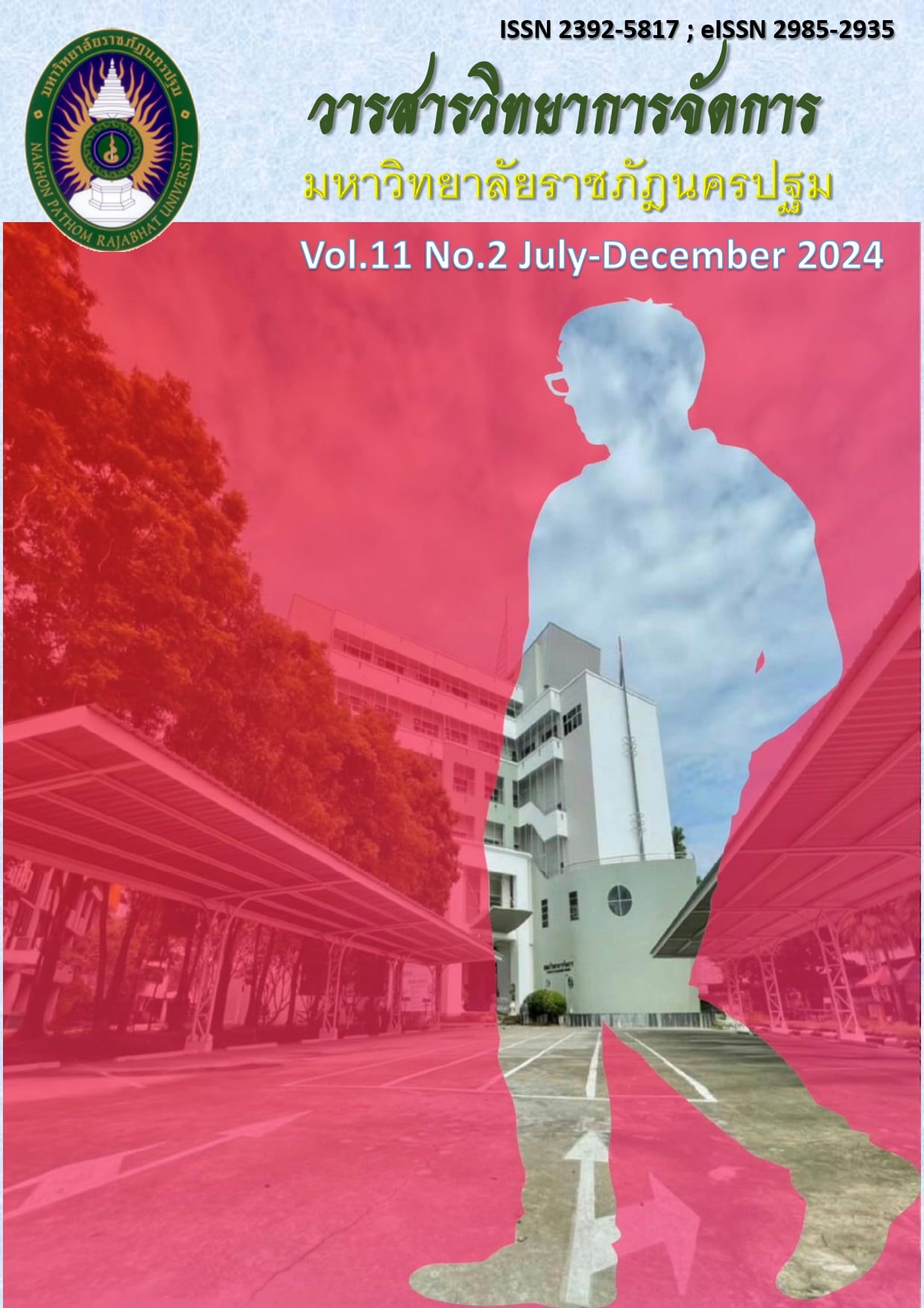การจัดการทุนมนุษย์เชิงกลยุทธ์เพื่อประสิทธิภาพขององค์การในอุตสาหกรรมอีสปอร์ต
Main Article Content
บทคัดย่อ
งานวิจัยนี้มีวัตถุประสงค์เพื่อศึกษา 1.อิทธิพลของการบริหารจัดการทุนมนุษย์เชิงกลยุทธ์ต่อระดับประสิทธิภาพขององค์การในอุตสาหกรรมอีสปอร์ต และ 2.อิทธิพลระหว่างความมุ่งมั่นในการทำงาน และประสิทธิภาพขององค์กรต่อระดับประสิทธิภาพขององค์การในอุตสาหกรรมอีสปอร์ต กลุ่มตัวอย่าง คือ ผู้ประกอบการ และผู้บริหารระดับสูงจำนวน 273 คน ใช้วิธีการเลือกตัวอย่างแบบเจาะจง การวิเคราะห์ ทางสถิติใช้โมเดลสมการโครงสร้าง (SEM)
ผลการวิจัยแสดงให้เห็นว่าการจัดการทุนมนุษย์เชิงกลยุทธ์ มีบทบาทสำคัญอย่างยิ่งในการสร้างความได้เปรียบทางการแข่งขันอย่างยั่งยืนในอุตสาหกรรมอีสปอร์ต องค์กรที่ให้ความสำคัญกับการพัฒนาบุคลากรอย่างรอบด้าน แสดงถึงประสิทธิภาพในการดำเนินงานที่ดีขึ้นอย่างมีนัยสำคัญ การพัฒนาบุคลากรอย่างครอบคลุมช่วยเสริมสร้างขวัญกำลังใจและผลการปฏิบัติงาน ของพนักงาน ซึ่งเน้นถึงความสำคัญของการสร้างสภาพแวดล้อมการทำงานที่สนับสนุนการเพิ่มผลิตภาพ ในองค์กร ยิ่งไปกว่านั้น การจัดการทุนมนุษย์เชิงกลยุทธ์เป็นปัจจัยสำคัญที่สุดในขับเคลื่อนประสิทธิภาพ ขององค์กรอย่างยั่งยืนในอุตสาหกรรมอีสปอร์ต ซึ่งสนับสนุนแนวคิดที่ว่าการจัดการทุนมนุษย์เชิงกลยุทธ์ที่มีประสิทธิภาพมีส่วนสำคัญต่อความสำเร็จในระยะยาวขององค์กร
1, อาจารย์ประจำวิทยาลัยนวัตกรรมและการจัดการ หลักสูตรบริหารธุรกิจบัณฑิต (นวัตกรรมการจัดการการกีฬา) มหาวิทยาลัยราชภัฏสวนสุนันทา, กรุงเทพมหานคร
2,3,4 อาจารย์ประจำวิทยาลัยนวัตกรรมและการจัดการ หลักสูตรบริหารธุรกิจมหาบัณฑิต (การจัดการธุรกิจอีสปอร์ตและบันเทิง) มหาวิทยาลัยราชภัฏสวนสุนันทา, กรุงเทพมหานคร
5* อาจารย์ประจำคณะศึกษาศาสตร์ หลักสูตรวิทยาศาสตรบัณฑิต (วิทยาศาสตร์การกีฬา) มหาวิทยาลัยรามคำแหง, กรุงเทพมหานคร
* Corresponding author: wassana.b@rumail.ru.ac.th
Article Details

อนุญาตภายใต้เงื่อนไข Creative Commons Attribution-NonCommercial-NoDerivatives 4.0 International License.
ทัศนะและข้อคิดเห็นของบทความที่ปรากฏในวารสารฉบับนี้เป็นของผู้เขียนแต่ละท่าน ไม่ถือว่าเป็นทัศนะและความรับผิดชอบของกองบรรณาธิการ
เอกสารอ้างอิง
Agag, G., and El-Masry, A. A. (2016). Understanding consumer intention to participate in online travel community and effects on consumer intention to purchase travel online and WOM: An integration of innovation diffusion theory and TAM with trust. Computers in Human Behavior, 60, 97-111. http://doi:10.1016/j.chb.2016.02.038
Allal-Chérif, O., Guaita-Martínez, J. M., and Montesinos Sansaloni, E. (2024). Sustainable esports entrepreneurs in emerging countries: Audacity, resourcefulness, innovation, transmission, and resilience in adversity. Journal of Business Research, 171. 114382. doi:10.1016/j.jbusres.2023.114382
Alo, O., Ali, I., Zahoor, N., Arslan, A., and Golgeci, I. (2023). Impression management and leadership in failing or failed business-to-business firms during and post-COVID-19: Empirical insights from Africa. Industrial Marketing Management, 113, 1-13. http://doi:10.1016/j.indmarman.2023.05.018
Ambatali, C. D., and Verspieren, Q. (2024). Human resource development and management in the Philippines’ national space capacity building program. Advances in Space Research, 73(1), 1031-1040. http://doi:10.1016/j.asr.2023.10.030
Babin, J. J., Chauhan, H. S., and Kistler, S. L. (2024). When pretty hurts: Beauty premia and penalties in eSports. Journal of Economic Behavior and Organization, 217, 726-741. http://doi:10.1016/j.jebo.2023.12.002
Chen, J., and Wu, Y. (2024). Would you be willing to purchase virtual gifts during esports live streams? Streamer characteristics and cultural traits. Computers in Human Behavior, 152.108075. http://doi:10.1016/j.chb.2023.108075
Dieste, M., Sauer, P. C., and Orzes, G. (2022). Organizational tensions in industry 4.0 implementation: A paradox theory approach. International Journal of Production Economics, 251. 108532. http://doi:10.1016/j.ijpe.2022.108532
Jordan-Vallverdú, V., Plaza-Navas, M.-A., Maria Raya, J., and Torres-Pruñonosa, J. (2024). The Intellectual Structure of Esports Research. Entertainment Computing, 49. 100628 http://doi:10.1016/j.entcom.2023.100628
Ke, X., and Wagner, C. (2024). What explains the next level of gaming? An experience-anticipation model for amateur esports participation. Computers in Human Behavior, 153. 108125 http://doi:10.1016/j.chb.2023.108125
Kopaneli, A. (2014). Finance, Marketing, Management and Strategy Planning. A Qualitative Research Method Analysis of Case Studies in Business Hotels in Patras and in Athens. Procedia Economics and Finance, 9, 472-487. http://doi:10.1016/s2212-5671(14)00049-5
Liu, Y., and Ossareh, H. R. (2021). Preview Reference Governors: A constraint management technique for systems with preview information. Systems and Control Letters, 152. 104932http://doi:10.1016/j.sysconle.2021.104932
López-Cabarcos, M. Á., Caby, J., Lugilde, S. A. S., and Piñeiro-Chousa, J. (2024). An approach to innovative eSports from a business perspective. Journal of Innovation and Knowledge, 9(4). 100555 http://doi:10.1016/j.jik.2024.100555
McLinton, S. S., and Pascale, S. J. (2024). Tilt in esports: Understanding the phenomenon in new digital contexts. Computers in Human Behavior Reports, 14. 100425http://doi:10.1016/j.chbr.2024.100425
Minami, S., Koyama, H., Watanabe, K., Saijo, N., and Kashino, M. (2024). Prediction of esports competition outcomes using EEG data from expert players. Computers in Human Behavior, 160.108351 http://doi:10.1016/j.chb.2024.108351
Paiola, M., and Gebauer, H. (2020). Internet of things technologies, digital servitization and business model innovation in BtoB manufacturing firms. Industrial Marketing Management, 89, 245-264. http://doi:10.1016/j.indmarman.2020.03.009
Zhou, D., Kautonen, M., Dai, W., and Zhang, H. (2021). Exploring how digitalization influences incumbents in financial services: The role of entrepreneurial orientation, firm assets, and organizational legitimacy. Technological Forecasting and Social Change, 173. .121120 http://doi:10.1016/j.techfore.2021.121120


